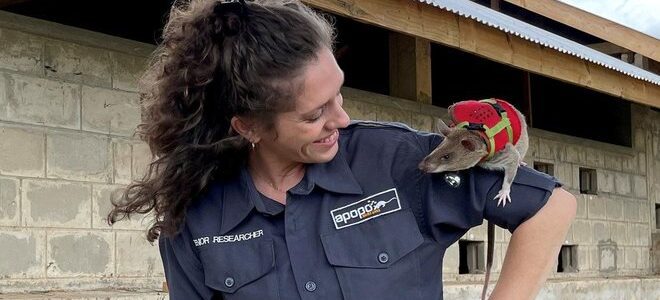
The Belgian NGO APOPO trains rats to search for people trapped under rubble, such as after earthquakes or hurricanes.
Previously, APOPO spent more than a decade at its base in Tanzania training dogs and Gambian hamster rats to search for mines and identify those infected with tuberculosis. The idea of rescue rats at APOPO had been nurtured for years, but the NGO lacked funding and a partner. The new project was launched in April 2021.
“Usually rats are quite curious, like to scout the area, and this is the most important thing for search and rescue operations,” said project leader scientist Donna Keane.
The rats are trained to search for survivors in an environment depicting a disaster area. Rodents are equipped with a high-tech “pack” that is attached to their body with a neoprene vest: after the rat finds the desired object in the room, it must pull the lever, giving a signal about the find, and then return to the base, where it will receive a reward for success.
Rat training is still at an early stage. APOPO, meanwhile, is working with the Technical University of Eindhoven in the Netherlands on a rat rescue pack: the prototype is a 3D-printed plastic container containing a live video camera, a bi-directional microphone, and a location-tagging transmitter. According to the developer of this equipment, Sander Verdizen, at first the rats did not understand what to do with it, but quickly adapted. “At the end of the day, they were just running around with a satchel, no problem,” he said.
However, the miniaturization of equipment, its adaptation to the conditions of the disaster zone turned out to be not an easy task. So, the GPS signal often does not pass through the ruins of destroyed buildings, but experts managed to get around this problem with the help of other trackers. Verdizen is also trying to make the “pack” more compact: although the current one weighs 140 g – twice as much as planned, its main problem is its size, with the current 10 cm in length. Later this year it is planned to introduce a modified version of the equipment.
Meanwhile, in Tanzania, Keane is making training more difficult for rats, preparing the animals for action in a real environment, accustoming them, for example, to the sounds of drilling equipment. So far, the results are encouraging: Keene says the rats are adapting well to increasingly challenging training environments. She recalled that from birth, rats have to survive in a variety of environments, including close to humans, which makes these mammals more stress-resistant in extreme situations.
However, APOPO does not forget to take care of future rescuers. They are not constantly trained – five days a week in sessions, fed with fresh fruits and vegetables, given time to relax in the playroom, although this pastime differs little from their training.
It takes at least 9-12 months to prepare a rat. In the meantime, Keane is planning the next stage of their training: teaching them how to operate in an environment that simulates a multistory collapsed building. Once the rats are comfortable with this, the plan is to move the project to Turkey, where APOPO’s partner, the volunteer rescue organization GEA, is based, and continue training the rats in an even more realistic environment. And only after that the rats can already be allowed to rescue work.
“Even if our rats can find one survivor in the ruins, I think we’ll be happy because we did a good deed,” said Keene.